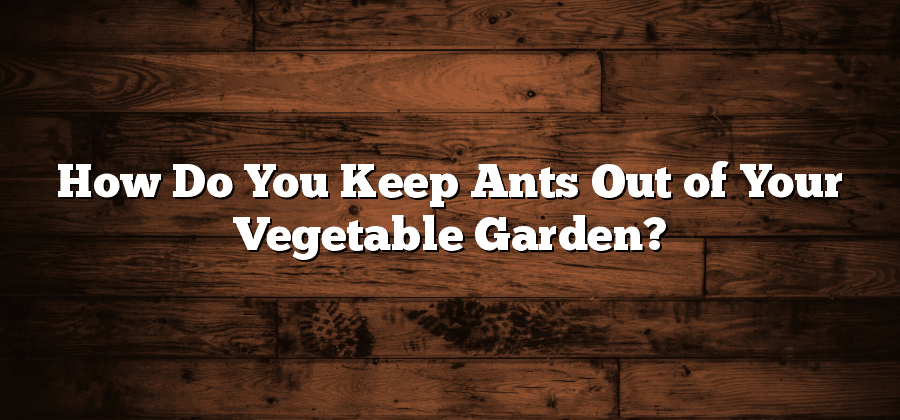Understanding the Ant Behavior in Vegetable Gardens
Ants are fascinating creatures that play a significant role in the ecosystem, including vegetable gardens. Understanding their behavior can help gardeners better manage and coexist with these tiny insects. In vegetable gardens, ants are often attracted to the sugary secretions left behind by aphids and other sap-sucking pests. They form a symbiotic relationship where they protect these insects from predators while enjoying their sweet rewards. Additionally, ants are known for their efficient scavenging abilities, quickly finding and transporting food back to their colonies.
Another aspect of ant behavior in vegetable gardens is their preference for warm and dry environments. These conditions are often found in raised beds and containers where the soil drains well and heats up faster. Ants may establish their nests in these garden structures, making it easier for them to access nearby plants and search for food. Understanding these tendencies can help gardeners identify the key areas where ants are likely to be active and implement effective strategies to deter them.
Creating a Barrier with Natural Repellents
While ants can be beneficial creatures in nature, their presence in vegetable gardens can cause damage to plants and disrupt the overall balance of the ecosystem. One effective method to deter ants from invading your garden is by creating a barrier using natural repellents. These repellents work by emitting strong smells and tastes that ants find displeasing, discouraging them from entering the garden.
One popular natural repellent is diatomaceous earth, a fine powder made from the fossilized remains of tiny aquatic organisms. When sprinkled around the perimeter of the garden or directly on ant trails, diatomaceous earth acts as a physical barrier that damages the ants’ exoskeletons and dehydrates them, ultimately leading to their demise. Additionally, using essential oils, such as peppermint, citronella, or lemon eucalyptus, can also serve as effective ant repellents. Mixing a few drops of these oils with water and spraying the solution around the garden can create a scent barrier that ants find repulsive.
Utilizing Physical Barriers to Keep Ants Away
Physical barriers can be an effective method to keep ants away from your vegetable garden. These barriers create a physical obstacle that prevents ants from accessing the plants and their food sources. One option is to use sticky barriers, such as adhesive tapes or bands, around the stems of your plants. These sticky substances trap the ants and prevent them from climbing up and reaching the leaves or fruits. Another approach is to create a physical barrier around the perimeter of your garden. This can be done by placing a band of material, such as copper tape or diatomaceous earth, along the ground. The sharp edges of copper tape and the abrasive texture of diatomaceous earth act as deterrents for ants, preventing them from crossing the barrier and entering your garden.
To further enhance the effectiveness of physical barriers, it is important to ensure their proper installation and maintenance. Carefully inspect the barriers for any breaks, gaps, or openings that ants could exploit. Additionally, make sure that the barriers are regularly and thoroughly cleaned to prevent debris buildup that may reduce their efficacy. Remember that physical barriers alone may not completely eliminate ants from your garden, particularly if there are other attractive factors in your yard. However, when combined with other ant control methods, such as removing food sources and utilizing natural repellents, physical barriers can significantly contribute to keeping ants at bay and protecting your vegetable garden.
Removing Attractive Food Sources for Ants
Ants are highly motivated by the availability of food sources, making it crucial to remove any attractive options in your garden. One effective way to minimize ant activity is to ensure that any fallen fruits or vegetables are picked up promptly. These can serve as magnets for ants, drawing them into your vegetable garden and potentially causing damage to your plants. Additionally, it is essential to clean up any food spills or crumbs in and around the garden area, as these can also be enticing to ants. By taking these preventive measures, you can significantly reduce the chances of ants being attracted to your garden and eliminate the risk of them causing harm to your plants.
Another step to consider when removing attractive food sources for ants in your vegetable garden is to avoid overfeeding. While it is important to provide the necessary nutrients to your plants, excessive fertilization can lead to an increase in ant activity. Ants are attracted to the sweet residue that can result from the breakdown of excess fertilizer, prompting them to infest your garden. Therefore, it is essential to properly measure and apply fertilizers according to the specific needs of your plants. By finding a balance in nourishing your vegetables without overfeeding, you can create an environment that is less appealing to ants, allowing your plants to thrive undisturbed.
Properly Mulching to Deter Ants
When it comes to controlling ants in your vegetable garden, mulching can be an effective strategy. Mulch serves multiple purposes in the garden, including weed suppression, moisture retention, and temperature regulation. However, when it comes to deterring ants, proper mulching techniques can make a significant difference.
One way to deter ants through mulching is by using materials that ants dislike or find challenging to navigate. For example, mulching with materials such as diatomaceous earth, coffee grounds, crushed eggshells, or even citrus peels can provide a natural barrier that ants are less likely to cross. These materials can be scattered around the base of plants or spread across the garden beds to create a deterrent effect. Additionally, avoiding mulches made from organic matter that ants are attracted to, such as wood chips or straw, can further discourage their presence in the garden.






